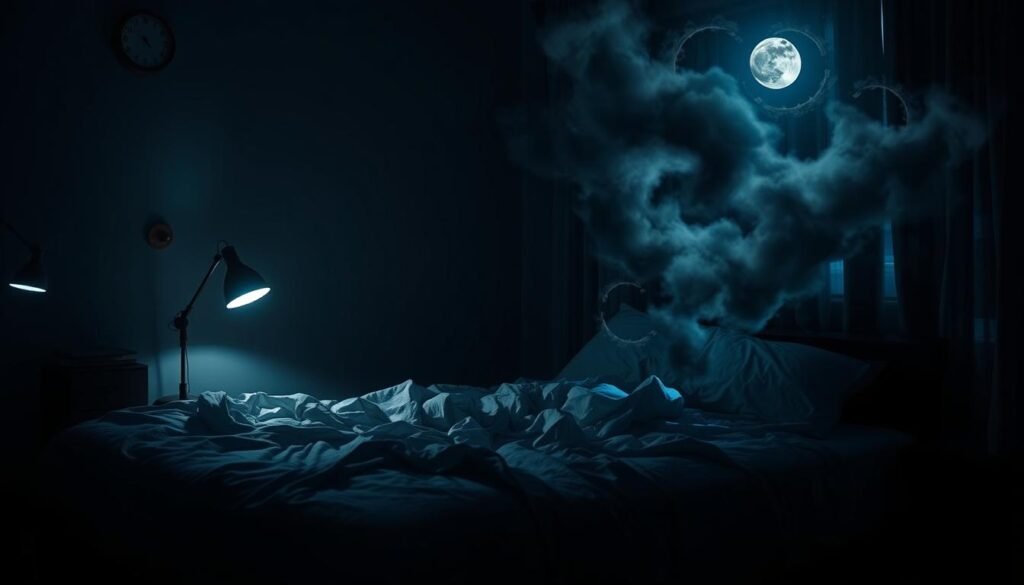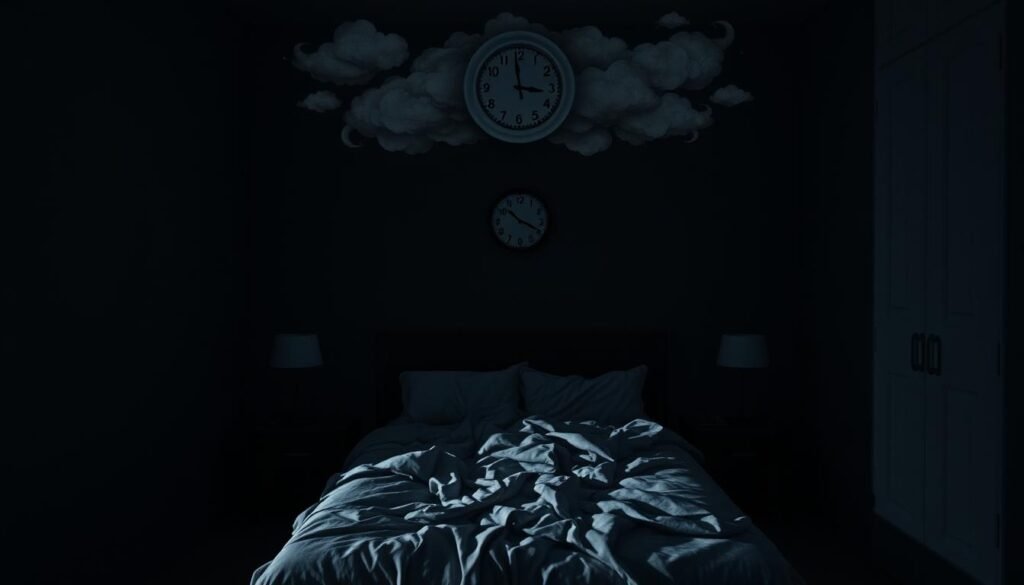Did you know one in three adults worldwide struggles with insomnia? This condition is a form of sleep anxiety. This alarming fact shows why it’s key to know the symptoms of sleep anxiety. By doing so, we can improve sleep health. In the U.S., nearly 20% of adults suffer from anxiety disorders. This shows how linked anxiety and sleep quality are. It’s essential for all to grasp this connection.
Many face *anxiety before bedtime*, which starts a troubling cycle. They fear not sleeping well, which then hurts their ability to drift off. This article will explore the common signs of sleep anxiety. It will offer insight into its effects and ways to manage it. With the right steps, one can find a path to better mental well-being.
Key Takeaways
- One in three adults experiences insomnia that may lead to sleep anxiety.
- Anxiety symptoms can include increased heart rate and trouble controlling worry.
- Chronic sleep deprivation can heighten mental health issues.
- Maintaining a consistent sleep schedule is crucial for alleviating sleep anxiety.
- Cognitive-behavioral therapy (CBT) is effective for improving sleep habits.
- Symptoms like panic attacks may indicate severe sleep anxiety.
Understanding Sleep Anxiety
Sleep anxiety involves worry about not being able to fall asleep. It can mess up how well you sleep and make anxiety disorders worse. If worries about sleep are drastic and often, it could be something serious. Knowing why sleep anxiety happens is key to handling it well.
About 10-20% of adults struggle with sleep anxiety. This issue often comes from their lifestyle or past traumas. It’s important to know what causes it to handle its effects better.
Those with anxiety disorders, like GAD, might also suffer from sleep anxiety. Up to 40% of GAD patients may have it. Also, insomnia hits 50-60% of people with anxiety disorders because of sleep anxiety.
Understanding sleep anxiety is vital for our mental health. Being aware of it leads to better ways to cope. This can greatly improve our well-being.
The Impact of Anxiety on Sleep
Anxiety affects how we sleep, leading to sleep troubles like insomnia. Many people with anxiety find it hard to fall or stay asleep. For instance, studies show 10–30% of folks get poor sleep. About 90% of young people with anxiety have sleep issues too.
Anxiety and sleep problems impact each other. Anxiety can mess up sleep. Bad sleep can make anxiety worse. This cycle hurts our mental and emotional health. A study in China showed older adults with poor sleep were more likely to feel anxious. It’s important to deal with these issues early.
Many with anxiety disorders also have sleep problems. Insomnia is common, affecting 24% to 36% of these patients. Those with long-term insomnia might also face anxiety, depression, and substance abuse. Treating both anxiety and sleep issues is vital for our health. Cognitive behavioral therapy (CBT) is a good treatment for insomnia caused by anxiety.
Understanding how anxiety and sleep are linked helps us see why treating both is needed. If you’re struggling with sleep because of anxiety, talk to a doctor. They can help you sleep better. For more on anxiety and sleep, check out this study on anxiety and sleep disturbances.
| Condition | Prevalence | Associated Risks |
|---|---|---|
| Inadequate Sleep | 10–30% | Higher anxiety risks |
| Sleep Problems in Youth | 90% | Increased anxiety symptoms |
| Chronic Insomnia | 24–36% | Risk for depression, substance abuse |
| Global Insomnia Prevalence | 6–10% | Common among mental health disorders |
Common Symptoms of Sleep Anxiety
Sleep anxiety’s symptoms greatly impact one’s day-to-day life. Knowing these signs helps handle the anxiety better. They mainly include two types: physical and emotional symptoms.
Overview of Physical Symptoms
Physical symptoms can be quite troubling:
- Rapid heartbeat
- Muscle tension
- Persistent sweating
- Fatigue
Physical symptoms often worsen sleep. A quick heartbeat can stop you from relaxing. Muscle tension makes it hard to get comfortable to sleep. These issues not only make it tough to start sleeping but also affect the entire sleep cycle. Insomnia, affecting 10% to 30% of people, is frequently linked with these signs of sleep anxiety.
Overview of Emotional Symptoms
Sleep anxiety also has emotional signs:
- Irritability
- Overwhelming worry
- Feelings of impending doom
Emotional symptoms trap you in a bad cycle. Anxiety stops good sleep, causing more worry about sleep. Anyone with general anxiety might worry more about sleep. Also, night panic attacks make falling asleep even harder.
If you’re facing these problems, finding the right help is key. Treating sleep anxiety symptoms with therapy and lifestyle changes helps a lot.
| Type of Symptoms | Examples | Impact on Sleep |
|---|---|---|
| Physical Symptoms | Rapid heartbeat, muscle tension, fatigue | It makes relaxing and sleeping difficult. |
| Emotional Symptoms | Irritability, overwhelming worry, feelings of doom | Makes you more anxious about sleep. |
Night Anxiety: What Does It Feel Like?
Night anxiety is when you feel very worried as bedtime gets close. This anxiety before bedtime leads to thoughts that won’t slow down. It makes it hard to relax. People worry a lot about not sleeping well. They fear the bad effects of not getting enough sleep. This makes the anxiety worse and bedtime can become very stressful.
At night, when things get quiet, people often think more about their worries. This makes the fear of sleep stronger, which can lead to not being able to sleep at all. Symptoms of night anxiety include:
- Restlessness
- Increased heart rate
- Headaches
- Stomachaches
- Tense muscles
- Excessive worrying about what’s coming next
- Excessive sweating
Many things can cause night anxiety. Stressful events like work problems, sickness, or loss can make anxiety worse for a while. Not getting enough sleep can also make anxiety stronger. This is especially true for people who already have anxiety issues. Research shows that 24% to 36% of people with sleep problems also have an anxiety disorder. For people with panic disorders, the chance of having sleep problems is three times higher.
Sleep can be disturbed by nightmares or panic attacks at night. These can wake people up and start a cycle of fear. This fear makes the anxiety even worse.

It’s important to understand these experiences to know what you’re dealing with. To get better sleep and handle night anxiety, treatments like cognitive behavioral therapy can help a lot.
Difficulty Falling Asleep
Having trouble falling asleep is common, especially for those battling sleep anxiety. People often stay awake, worried and thinking too much. This issue marks the start of a harmful sleep anxiety cycle. When anxiety grows, relaxing gets harder, making the problem worse. If this happens at least three times a week, it could mean insomnia.
Stress, caffeine, certain meds, and health problems can all lead to this issue. Research shows that anxiety-driven insomnia often causes waking up often at night, mainly because of anxiety itself. Managing these symptoms is key to getting good sleep again.
Cognitive behavioral therapy (CBT) is a good way to deal with this kind of insomnia. CBT provides coping strategies and new ways of thinking to help stop the cycle of worry that keeps you awake. Changing your lifestyle can also improve sleep. Things you can do include:
- Avoiding caffeine at least four hours before bedtime
- Refraining from alcohol consumption close to sleep
- Steering clear of heavy meals before lying down
If you’re dealing with both depression and anxiety-driven insomnia, it’s important to talk to a mental health expert. With over 40 million Americans struggling with sleep problems, finding the cause of insomnia is crucial for better health. Ignoring chronic sleep anxiety can lead to serious problems like heart disease, obesity, and diabetes.
Knowing how anxiety and sleep affect each other can help people find effective solutions and improve their sleep habits.
| Factor | Impact on Sleep |
|---|---|
| Caffeine Consumption | Increases alertness; disrupts sleep |
| Alcohol Intake | May initially induce sleep but leads to awakenings |
| Heavy Meals | Causes discomfort and disrupts sleep onset |
| Stress Hormones | Elevated cortisol levels hinder relaxation |
| Exercise | Reduces stress hormones; improves sleep quality |
Sleep Disturbances and Their Effects
Sleep disturbances like insomnia can deeply affect your overall well-being. These problems show up in different ways and hurt both your body and mind. Knowing about the types of sleep troubles and their impact is key for dealing with anxiety and sleep issues.
Types of Sleep Disturbances
There are several common sleep troubles that people face. They vary in how severe they are and what causes them:
- Insomnia: The most common sleep issue, often linked to anxiety. It makes it hard to fall or stay asleep, causing tiredness and irritability.
- Restless Legs Syndrome: This condition gives you a strong urge to move your legs. It can interrupt your sleep, making insomnia worse.
- Sleep Apnea: It causes your breathing to stop and start in your sleep. This leads to being very tired during the day and having trouble focusing.
Relationship Between Sleep Disturbances and Anxiety
The link between sleep troubles and anxiety is strong. Studies show around 60-70% of people with generalized anxiety disorder have serious sleep issues. Insomnia and anxiety often occur together, making it important to tackle both. Low levels of vitamin D and issues with calcium balance can lead to insomnia and bad sleep, showing how our bodies’ inner workings affect sleep and anxiety.
Not dealing with sleep disorders can lead to big health problems. These include a higher risk of heart disease and stroke. Sleep problems don’t just hurt your health, but also your schooling, job, and safety. Focusing on both mental and sleep health can help break this cycle and improve your life.
Restlessness at Night
Many people struggle with restlessness at night due to anxiety. They might fidget, toss and turn, or have leg movements that hurt their sleep. Sleep issues like these worsen sleep quality. It gets hard for them to feel fresh and alert the next day.
About 30% of adults will deal with anxiety disorders in their life. Sleep problems are common with these disorders. Anxiety can make sleep problems worse, creating a cycle where good sleep seems impossible. Stress or big life changes often trigger insomnia.
Anxiety can disrupt important sleep phases, especially the REM phase. This phase is key for mental and emotional health. Waking up anxious and not being able to sleep again makes anxiety and stress worse. This leads to more sleep loss.
To lessen nighttime restlessness, some practices can help. Regular exercise boosts mental health and can lower anxiety symptoms. Having a bedtime routine also helps your mind and body relax. For more tips, look into strategies for sleep anxiety. These methods can offer great relief.
Bedtime Worries: The Cycle of Anxiety
Bedtime can be hard for kids, filled with worries that keep them awake. As night falls, they might feel anxious and find it tough to calm down. They often think about times they couldn’t sleep, which makes it even harder to relax.
Many children feel pressured to do well in school, which causes more anxiety at night. Especially older kids who want to be perfect are prone to this. Those with autism and ADHD feel this even more because they’re more sensitive.
Kids with bedtime anxiety might stay awake for a long time, hoping to sleep but feeling stuck in worry. Things like the light from screens can mess with their sleep. This makes it harder for them to calm down and sleep.
A good way to deal with these worries is to have a regular bedtime routine. Doing things like taking a warm bath or dimming the lights helps their body get ready for sleep. Reading a calm story can also make it easier for them to relax.
Learning to sleep on their own can be hard for kids. But with programs that help them do it step by step, they can learn. Mandy Gurney has lots of experience with children’s sleep problems and offers great advice.
Using Cognitive Behavioral Therapy (CBT) is another good way to handle anxiety at night. CBT helps kids get better at sleeping and reduces anxiety and insomnia by teaching them new ways to think and relax.
| Strategies for Managing Bedtime Worries | Description |
|---|---|
| Establishing a Bedtime Routine | Creating a consistent pre-sleep routine helps signal the body to wind down. |
| Warm Bath | A 10-minute bath can trigger melatonin release, aiding relaxation. |
| Dimming Lights | Lowering brightness can further promote the body’s natural sleep hormone production. |
| Gradual Retreat Programs | These programs gradually teach children to fall asleep independently with reduced anxiety. |
| Cognitive Behavioral Therapy (CBT) | CBT addresses both sleep disorders and anxiety, providing effective coping mechanisms. |
| Mindfulness Techniques | Mindfulness practices help children refocus and calm anxious minds. |

Insomnia Due to Anxiety
Many people struggle with insomnia caused by anxiety, which lowers their quality of life. This problem often shows up as trouble falling or staying asleep because of constant worry. Folks with sleep disorders like generalized anxiety disorder or PTSD notice it more.
Not sleeping well can make you feel tired and cranky. Anxiety gets worse without enough sleep, making a cycle of distress and restless nights. Studies show sleep loss can increase cortisol, making anxiety spike. If insomnia hits, managing it with therapy and lifestyle adjustments is key. For tips, check out these strategies.
A regular sleep schedule is crucial for better rest. Avoiding caffeine, sugar, and alcohol at night helps. Progressive muscle relaxation is also good for easing tension. Tackling insomnia and anxiety together improves sleep and mental wellness.
Coping Mechanisms for Sleep Anxiety
Finding ways to deal with sleep anxiety often means trying out a mix of methods. Finding the right coping strategies can really improve how well you sleep and feel overall. By testing different techniques, you can discover what works best for you.
Lifestyle Changes
Simple changes in your daily habits can have a big effect on your sleep. Getting into a regular sleeping routine helps your body know when it’s time to sleep. Exercise is also key as it boosts your health and helps you relax, lowering anxiety.
Practices like meditation and relaxing your muscles step by step can quiet your mind and body. This makes it easier to fall asleep and stay asleep.
Therapy Options
Therapy offers effective tools to tackle sleep anxiety. Cognitive behavioral therapy (CBT) is especially good. It works on changing the negative thoughts and actions that disturb your sleep.
Working with a professional therapist can help you develop better ways of coping. This can lead to more restful nights.
Medication Considerations
For some, anxiety medication helps with sleep issues. Yet, it’s important for doctors to closely watch any medication use. This is because there can be risks of becoming dependent or experiencing bad effects.
Talking to a doctor about options like melatonin is a good idea. However, it’s key to be careful about how long you use it.

Conclusion
It’s important to understand sleep anxiety and its impact on health. This condition can ruin sleep quality and harm our emotional and physical well-being. Especially teens face this, with over 70% of U.S. teenagers aged 12 to 14 not getting enough sleep due to anxiety.
Seeing the link between anxiety and sleep problems is the first step towards better sleep. Talking to healthcare experts and learning coping skills can make a difference. For example, personal thoughts on sleep often don’t match up with sleep studies, showing how complex these issues are. You can find more about recognizing anxiety’s physical signs at this link.
Dealing with sleep anxiety helps improve mental and physical health. Making good sleep a priority and knowing how sleep and anxiety interact can lead to betterment. Steps like sticking to a sleep schedule, creating a peaceful bedtime routine, and making your sleeping area ideal are key to restful nights and managing anxiety well.